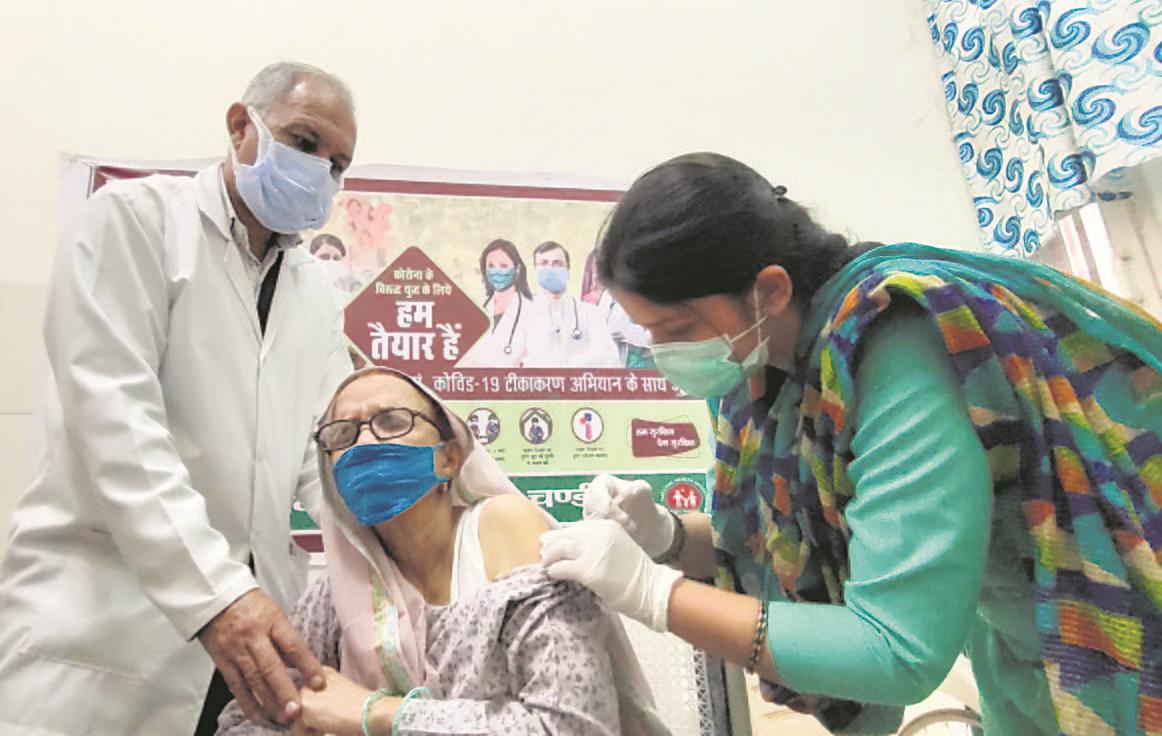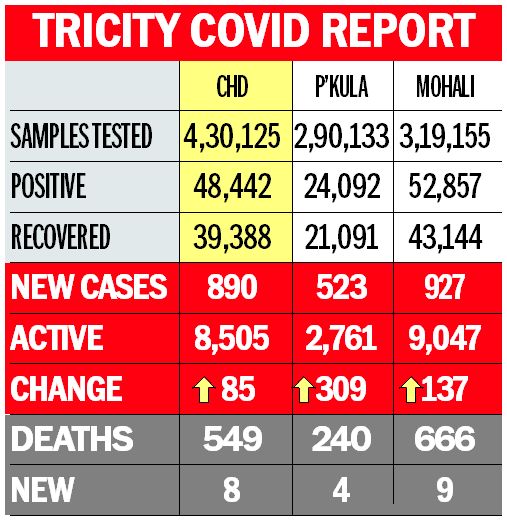
A woman gets the Covid vaccine in Dadu Majra. Pradeep Tewari
Dushyant Singh Pundir
Tribune News Service
Chandigarh, May 7
All eyes are on the PGI with a surge in the number of Covid patients needing hospital beds and oxygen. Though the premium institute has reserved 404 beds for the purpose, clamour for expanding the bed capacity has been growing in the city where bed shortage is beginning to impact treatment of Covid patients adversely.
- Also read: Need to increase beds at Panchkula private hospitals, says Haryana Speaker
- Consider Oxygen-fitted auto ambulances in tricity: Punjab and Haryana High Court
- Chandigarh fixes oxygen quota for private hospitals
 With more Covid patients getting critical, the UT Administration has sought the immediate intervention of the Union Ministry of Health and Family Welfare for proper utilisation of the infrastructure of the PGI.
With more Covid patients getting critical, the UT Administration has sought the immediate intervention of the Union Ministry of Health and Family Welfare for proper utilisation of the infrastructure of the PGI.
In a recent letter to the ministry, the UT stated that it was trying to tackle the crisis by enhancing the capacity of Government Multi-Specialty Hospital (GMSH), Sector 16, and the Government Medical College and Hospital (GMCH), Sector 32, and setting up mini-Covid care centres with the help of social organisations, yet the help of the PGI was urgently required.
The Administration had requested the ministry to direct the PGI to enhance the number of Covid beds to at least 700, as they have nearly 2,000 beds.


Adviserspeak
We will be able to win the battle against the coronavirus only if all three medical institutions in Chandigarh work as a team. All our resources should be used optimally

Medical experts said the GMCH and the GMSH had increased their bed capacity to 564 by overstretching their resources. Since the PGI had stopped OPD services and elective surgeries, the institute should have enhanced its capacity to at least 1,000 Covid beds with 30 per cent ventilators and oxygen attached with the remaining beds, they said.
With a faculty strength of nearly 400 and approximately 1,000 resident doctors, the PGI was offered Infosys Serai, located on the campus of the institute, to set up more beds there, but the institute refused to do so. However, later an NGO came forward to set up a 100-bed temporary hospital there. However, the institute stated that the Infosys Serai facility fell under the jurisdiction of the UT Administration.

What the PGI says
Due to the second Covid surge, most patients reporting are sick/critical requiring prolonged care and oxygen/ventilator support. To create a Covid bed facility, there is a requirement of defined logistics/oxygen support as well as well-trained manpower.

Amid the Covid rage, it was shocking that even the health staff of the PGI had not opted for 100 per cent vaccination and if they got infected with the virus, who would serve the patients, the experts questioned.
Reacting to the allegations, Prof Ashok Kumar, official spokesperson for the PGI, said the PGI was providing care to Covid as well as non-Covid patients reporting at the institute.
“At present, of the total bed strength of 2,000, 404 beds have been specifically allocated for the treatment of Covid patients. As per the available bed census, at any time there are around 350-380 Covid patients and over 1,000 non-Covid patients remain admitted to the Institute,” he said. Besides, the institute was also providing daily care to around 150 non-Covid ICU/critical patients and more than 50 different major/minor operative procedures were done. The antenatal care to pregnant women and radiotherapy care was being imparted to cancer patients on a daily basis. “Yet, with a daily rise in the number of Covid patients reporting at the institute, the number of beds is also increased accordingly,” he said.
Being a premier multi-specialty institute of North India, the institute is the only care centre for the states of Punjab, Haryana, Himachal Pradesh for providing tertiary-level super-specialty care to non-Covid patients. Yet, the institute is doing its best within the constraints for providing care to Covid as well as non-Covid patients, he said.
With a rise in the caseload, medical oxygen has been in acute shortage as the region grapples with a deadly second wave of the virus, but the PGI has failed to set up even one oxygen plant and solely depends on a private supplier, whereas the UT Administration has set up three oxygen plants during the peak of the pandemic.
Kumar said at present, the daily oxygen requirement of the institute was around 20 MT and it was being met by the institute with a back-up of around two days. Besides, as an interim arrangement, the institute had in stock around 350 oxygen cylinders to provide care to the patients. The process for the installation of one more oxygen storage tank was underway and it would be done in the near future. The possibility for an independent oxygen plant for the institute was being explored.
Due to the pandemic, new recruitment was not being sanctioned. Thus, to provide healthcare services to both Covid as well non-Covid patients reporting at the institute, elective planned procedures as well as new OPD services had been curtailed, he said.
Join Whatsapp Channel of The Tribune for latest updates.



























